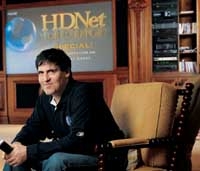The Cuban Revolution Page 2
 Making His Mark Cuban is actually a master of both the remote control and the computer keyboard. He built the MicroSolutions computer-integration business well ahead of the so-called "year of the network," then sold it for millions. He started Broadcast.com, an aggregator of Internet radio stations, at a time when using bandwidth for streaming audio made as much sense as squeezing a tractor trailer down a country lane. He later sold it to Yahoo for billions. In 2001, he used that fortune to start HDNet, the first full-time high-def TV channel. He then persuaded DirecTV to carry it instead of fitting maybe four standard-definition channels into the same bandwidth at a time when HDTV sets cost $8,000 and hardly anyone owned one.
Making His Mark Cuban is actually a master of both the remote control and the computer keyboard. He built the MicroSolutions computer-integration business well ahead of the so-called "year of the network," then sold it for millions. He started Broadcast.com, an aggregator of Internet radio stations, at a time when using bandwidth for streaming audio made as much sense as squeezing a tractor trailer down a country lane. He later sold it to Yahoo for billions. In 2001, he used that fortune to start HDNet, the first full-time high-def TV channel. He then persuaded DirecTV to carry it instead of fitting maybe four standard-definition channels into the same bandwidth at a time when HDTV sets cost $8,000 and hardly anyone owned one.
Cuban recalls, "We told DirecTV, 'Look, the people who are buying high-def receivers are your best customers. They spend the most money, they churn the least, and if you don't do high-def, somebody else will. Other than HBO, no one is providing you any HDTV content. On top of that, you want to sell DirecTV in stores, and no one else is going to give you a signal that you can use on the sales floor. So it's a win-win.' At the time, we had to pretty much create all the content we broadcast."
The 2002 Winter Olympics from Salt Lake City might not have made HDNet a household name, but it certainly put the fledgling network on the broadcasting map. While NBC had a staff of 2,000 and its own cafeteria, it let HDNet produce all its high-def coverage from two trailers in the parking lot. After that, Dish Network and cable-operator Charter Communications began carrying the channel. Soon all the major cable systems except Comcast and Cablevision were on board. Cuban once even toyed with the idea of adding over-the-air HDTV affiliates, but that created too much animosity from his satellite and cable carriers - the same reason he won't stream HDNet online.
HDNet and HDNet Movies are usually part of a high-def programming tier that costs about $10 a month. Each night on HDNet is devoted to a different genre: Mondays to family dramas like Smallville, Tuesdays to news features like HDNet World Report, Wednesdays to detective-shows like Blind Justice, Thursdays to NHL games, Fridays to cage fighting, Saturdays to more hockey (or soccer, in season), and Sundays to concerts. "We want to be a general entertainment network like TNT or USA," Cuban says. HDNet Movies mainly shows films from the '80s and '90s, but there are also world premieres, like the upcoming Bubble.




























































